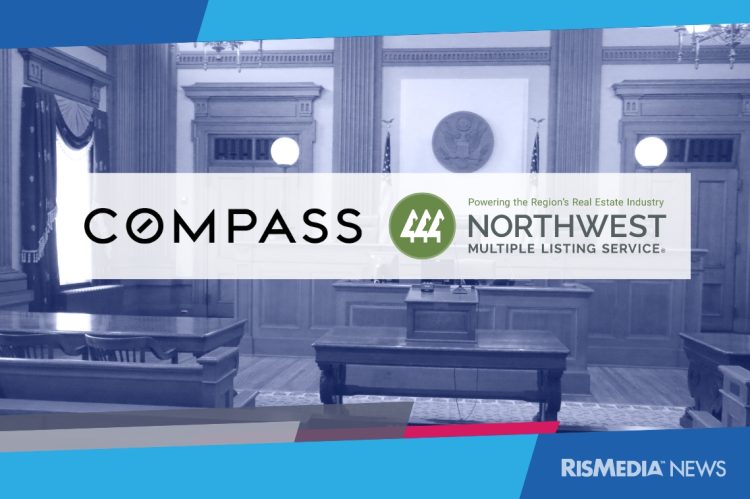A federal judge dealt a blow to the Northwest Multiple Listing Service (NWMLS) on Wednesday, denying its attempt to halt discovery in an explosive federal antitrust case that’s part of a nationwide legal showdown reshaping how homes are sold across America.
U.S. District Judge Jamal N. Whitehead rejected NWMLS’s motion to stay discovery while the listing service fights to dismiss the lawsuit brought by Compass, according to court documents filed Wednesday with the U.S. District Court for the Western District of Washington in Seattle.
The ruling means Compass can now dig through NWMLS’s internal documents and communications—exactly what it wanted to avoid. In his ruling, Whitehead wrote that while NWMLS’s motion to dismiss “would be dispositive if successful,” the court wasn’t “convinced that the plaintiff will be unable to state a claim for relief.” He also noted that granting the motion for dismissal would unnecessarily delay litigation.
The Compass case against NWMLS is just one front in Compass CEO Robert Reffkin’s broader crusade against what he sees as anticompetitive gatekeepers controlling American real estate. Two months after filing against NWMLS in April, Compass filed another antitrust lawsuit against Zillow in Manhattan federal court.
Both cases center on the same key issue: Compass’s signature three-phase marketing strategy, which starts with private “Compass private exclusives” before moving to “coming soon” status and, finally, to public MLS listings.
It’s an approach that nearly half of Compass’s sellers used in early 2025, allowing them to test pricing and avoid negative metrics like “days on market” or visible price reductions that can hurt sellers, according to the brokerage.
The Zillow battle emerged from the portal’s new “Listing Access Standards,” which require any publicly marketed home to appear on the MLS (and Zillow) within 24 hours. Otherwise Zillow will prevent the listing from being shown to its more than 200 million monthly visitors.
Compass alleges it forces agents to prioritize Zillow over their clients’ preferred marketing strategies. And Compass views NWMLS’ efforts to stifle its private listings in a similar vein.
“Compass is proud to support Washington homeowners who are asking the right question: Why are we the only homeowners in America without a choice in how we sell our homes?” Reffkin previously told RISMedia. “The NWMLS system wasn’t built to serve homeowners—it was built to preserve the monopolistic power of the NWMLS.”
In its own court responses, NWMLS has accused Compass of “free-riding,” writing last month that the brokerage is relying on the “false principle that NWMLS bears an obligation to deal with it on Compass’ preferred terms.”
The stakes in both cases are enormous. Zillow controls roughly 80% of online home searches, receiving 2.4 billion visits in the first quarter of 2025 alone. NWMLS, meanwhile, handles nearly 100% of Seattle-area residential transactions, with Compass characterizing both entities as monopolies. Specifically, Compass has claimed that NWMLS’s ownership structure (consisting of multiple competing brokerages) creates an antitrust violation.
NWMLS case backstory
The Seattle story began in July 2024, when Compass executives sat down with NWMLS leadership to discuss what the brokerage saw as the country’s most restrictive listing rules. Unlike virtually every other MLS in America, NWMLS prohibits “office exclusives” entirely—making it the lone holdout among all 50 states, according to Compass.
“In every U.S. State outside of Washington, and in every other MLS outside of NWMLS, MLS rules allow homesellers and their brokers to use office exclusives to market properties outside of the MLS,” Compass argued in court documents.
For seven months, Compass pushed for changes, but NWMLS said no, the brokerage said, although NWMLS has sharply disputed Compass’s characterization of the back-and-forth, claiming it merely enforced its long-standing rules which apply to all brokerages, and are designed to maintain transparency and fairness for consumers.
In March, Reffkin took to Instagram to blast NWMLS and launched dozens of private listings in direct defiance of the rules. This led to what Compass describes as Seattle-area home sellers being “abruptly” blocked from premarketing their properties. NWMLS retaliated by cutting Compass’s data feed, effectively blinding the brokerage’s website to new listings across the Seattle market.
Windermere CEO OB Jacobi, whose company is a major player in Seattle real estate and has six affiliated agents on NWMLS’s 15-member board, accused Compass of playing dirty pool. Compass shot back, alleging Windermere was pulling the strings at NWMLS to protect its market position.
The gloves came off completely on April 25, when Compass filed its federal lawsuit alleging NWMLS operates as “a monopolistic combination of competing real estate brokers.” The complaint depicted an entrenched system designed to shut out innovation and consumer choice.
Industry insiders are watching both cases closely. If Compass wins, it could reshape how homes are sold nationwide, giving sellers more control over how they market their listings. If NWMLS prevails, it would validate the traditional MLS model and potentially discourage other brokerages from pursuing a similar private listings strategy.
Editor’s note: This story was updated on 8/8/25, correcting the name of the U.S. District Judge from John Weinberg to Jamal N. Whitehead.












